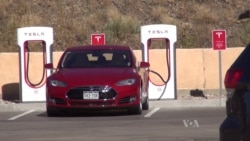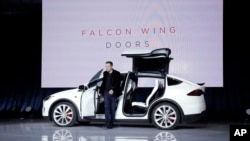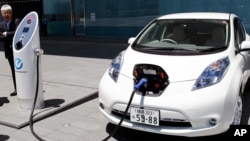Neil Belmore and his son Matt are on a road trip from Toronto to Palo Alto, California - 4300 kilometers - driving without stopping for gas. They're powering up their all-electric Tesla Model S at charging stations along the way.
Not too long ago, electric car owners couldn't plan a road trip like that. The lack of charging stations outside of major cities kept them fairly close to home. That, and the high price tag of electric cars, meant these alternative vehicles were only a tiny slice of the auto market.
Dawn of the electric age?
But at least one of those obstacles is being overcome. It's getting easier to find charging stations all across the country, and around the world. Many Internet maps can now display the expanding network.
There are several stations in the parking lot of a luxury Colorado shopping center. The parking lot attendant calls the sleek oval electric charging stands a bargain.
“We give you one hour free to charge your Tesla,” he explained.
In Kansas, after driving down a country road surrounded by sunflowers and growing crops, Tesla drivers can power up for free at a Holiday Inn. That's where the Belmores have stopped to plug in their shiny black Tesla. Neil says he and his son are sharing the driving.
“He’s a very fast Tesla driver, I have to say. He makes me nervous.” Matt laughed.
After just 30 minutes, the Belmore's battery-powered Tesla rolls silently back onto the nearby interstate highway, with enough power to go another 240 kilometers — plenty to reach the next Supercharger.
Forward-thinking families pull in to Golden Real Estate in Colorado, to take advantage of the free charge-ups Jim Smith offers to any electric car. Also in Smith’s parking lot are shiny solar panels, so he gets plenty of clean power from the sun.
“We want to save the planet from global warming and from wasteful use of energy," he explained. "And we also want to eliminate our dependence on foreign oil.”
Nearly 200 Nissan dealers in the U.S. offer a free, fast charger called a CHAdeMO for Leaf owners.
Boulder Nissan’s Nigel Zeid says many campgrounds and homeowners also offer charging stations that drivers can find on the Internet through “Plugshare.”
“Once you sign into Plugshare, you can see all the people’s homes, and you can contact them, and they leave little messages like if you want to charge and I’m not there, this is the code to the garage," he said. "Or here’s my cell phone number or text me.”
Planning for the future
These developments do not surprise Hunter Lovins, a world-renowned promoter of sustainable development. She not only owns an all-electric Leaf, she charges its batteries through an array of solar panels right in her own backyard.
“The easy thing about this Leaf is I simply plug it into the wall," she said proudly. "Today, on a nice sunny day, the sun is charging my Leaf. When the sun goes down, there’s a battery bank over there, and that charges the Leaf.”
While solar panels, charging stations and electric cars are currently expensive, Lovins says their costs are dropping so fast, they might someday outnumber not only gas-powered cars, but hybrid vehicles that can run on both gas and electricity. She points to the telecommunications industry as a model.
“Just as people in remote areas are leapfrogging straight to cell phones from no phone, they’ll go from no car to electrics rather than an intermediate step through hybrids,” she said.
As for filling stations, Lovins says that if they continue to focus on fossil fuels, they might become dinosaurs. Driving by one of her former, favorite gas stations, Lovins shakes her head.
“I used to be a regular customer over there at Boulder Gas, and I would stop in and say hi to the guys behind the counter, and buy something to eat and fill up my car…. Haven’t been in there since I bought the Leaf,” she said.
Lovins suspects that gas stations will soon feature electric charging stations next to traditional fuel pumps. And some day soon, she hopes charging stations might be as common as gas stations.







